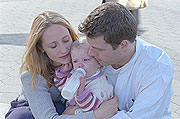
FRIDAY, Nov. 15, 2013 (HealthDay News) — Although today’s fathers pitch in with routine child care more than dads did a few decades ago, a new study finds that mothers are still doing more. Even when both parents work outside the home.
Researchers looking at middle-class, dual-income households found that mothers took on the majority of child care-related tasks, and were still spending more of their free time on child care than men.
“Both parents may think they should divide child care responsibilities equally, but mothers still feel a special pressure to show they are being the best parent they can be,” study co-author, Sarah Schoppe-Sullivan, an associate professor of human sciences at Ohio State University, said in a university news release.
The study, published online in the December issue of the journal Family Relations, involved 182 couples living in double-income households. The researchers collected data on the parents from the third trimester of pregnancy through the first nine months of parenthood.
The couples kept diaries of both a workday and a non-workday, recording everything they did in each 24-hour period. The participants filled out this diary when their child was 3 months old and again at 9 months old.
The researchers divided parenting duties into four categories:
- Positive engagement: parents played with, talked to or read to their child
- Responsibility: providing indirect care, such as scheduling check-ups
- Accessibility: supervising the child, but no other parenting activities
- Routine care: bathing, feeding and diapering
Both mothers and fathers were highly involved with their children, the study revealed. On non-workdays, parents spent more than 2.75 hours of positive engagement with their 9-month-old babies.
Mothers, however, spent more than twice as much of their parenting time on routine care than fathers. This was true even after taking into account time spent breast-feeding and pumping breast milk.
“Mothers spent more time on the challenging but vital activities like feeding and bathing,” Letitia Kotila, study lead author and a doctoral student in human sciences at Ohio State, said in the news release. “The fathers were most involved in positive engagement and accessibility which, while important, may not be as demanding as the routine care. They took on more of a helping role rather than that of the primary caregiver.”
Women’s greater parenting burden started soon after their baby was born, the study found. By the time their children were 9 months old, women spent almost 70 percent of their time on an average weekday, when they were not working or sleeping, on some type of child care. Meanwhile, fathers spent 50 percent of their free time on similar tasks involving their children.
“Although the mothers and fathers had similar work constraints, the mothers still invested significantly more time into parenting,” Kotila noted.
The researchers added that parents are likely to keep their routines and behave the same way with additional children as they do with their first child. They advised women to be careful not to do too much and to give themselves a break.
“We have always talked about fathers doing more, but it may be that mothers should do less. They need to relinquish some control,” Schoppe-Sullivan said. “Today’s dads are likely doing much more child care than fathers of previous generations. But the mothers are also doing more.”
More information
The U.S. National Library of Medicine has more about parenting.
Copyright © 2026 HealthDay. All rights reserved.

